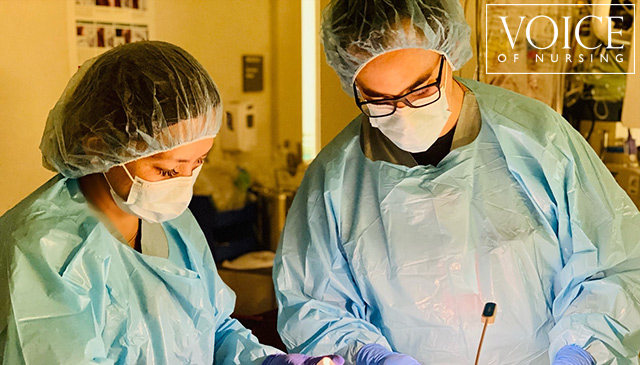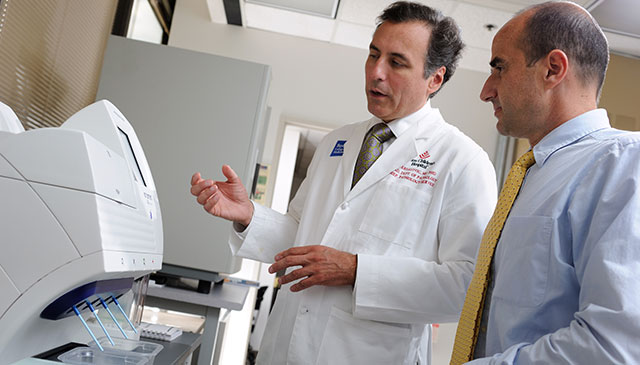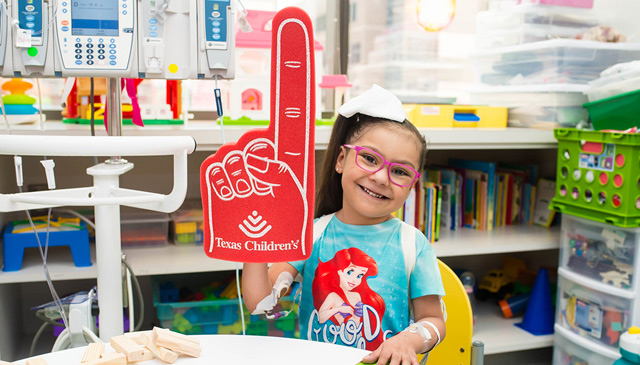
Nurse Jeanne Orot shares why she loves working as a Gastrointestinal Procedure Suite nurse. Read more

Nurse Jeanne Orot shares why she loves working as a Gastrointestinal Procedure Suite nurse. Read more
In yet another monumental achievement made possible through the hard work of our One Amazing Team and your commitment to every child and family we serve, Texas Children’s has earned recognition from U.S. News & World Report as the #2 children’s hospital in the country.
In addition to Texas Children’s historic rise to #2 in the overall list, the 2022-23 U.S. News & World Report Best Children’s Hospital survey included Top 10 spots for every subspecialty:
Texas Children’s is also ranked as the #1 children’s hospital in Texas and #1 in the Southwest Region – rounding out the national honors in what President and CEO Mark A. Wallace called a “pivotal moment that reflected everything we’ve accomplished together this year.”
“These tremendous outcomes are the result of the steadfast leadership, unwavering dedication and sincere passion you have for Texas Children’s mission,” Wallace wrote in announcing the exciting news to the organization. “Our eight in-chiefs, our five executive vice presidents, our medical and administrative leaders, and our faculty and staff are without a doubt the greatest teams in our organization’s history.”
U.S. News & World Report introduced the Best Children’s Hospitals ranking in 2007 to help families of children with rare or life-threatening illnesses find the best medical care available. The rankings are the most comprehensive source of quality-related information on U.S. pediatric hospitals.
They rely on clinical data from nearly 200 medical centers through a detailed survey that analyzes measures, such as patient safety, infection prevention and adequacy of nurse staffing. In addition, each hospital’s score is derived from surveys of more than 15,000 pediatric specialists who are asked where they would send the sickest children in their specialty.
In 2021, only 89 children’s hospitals were ranked in at least one of the 10 pediatric specialties evaluated for the annual report. Ten hospitals ranked at the top of their class and were named to the 2022-2023 Honor Roll. For more information, visit usnews.com/childrenshospitals.
“Consistent collaboration, newfound discoveries and extraordinary patient care is what has brought us to where we are today. But we all know that for Texas Children’s, this is only the beginning of our bright future ahead,” Wallace said. “Let’s cherish and celebrate this moment – and then let’s gear up to climb even higher. I have no doubt that with this team, everything is possible!”
To read the full news release announcing Texas Children’s latest rankings from U.S. News & World Report, click here.

Texas Children’s Hospital recently hosted the 7th annual REACH (Research, Education and Awareness for Children with Hirschsprung Disease) Symposium. More than 60 parents and patients traveled from 10 states – including California, Colorado, Florida, Louisiana and Oregon – with additional families participating via livestream, making it the best-attended symposium in REACH’s history.
REACH is an international, parent-led non-profit organization committed to increasing awareness, promoting education, connecting families and supporting research initiatives for Hirschsprung disease, which is a congenital condition of the colon. Patients born with Hirshsprung disease have severe colon motility issues due to absence of nerve cells in the affected segments of the colon. These children suffer from intestinal obstruction, colon infections and fecal incontinence. REACH contacted Texas Children’s more than a year ago to discuss holding the symposium, due to the hospital’s outstanding reputation in the field of colorectal surgery, and specifically for its work with Hirschsprung disease patients.
In addition to hosting and organizing the event, Texas Children’s was able to put forth its expert multidisciplinary team, which cares for patients with this disease.
Dr. Danielle Hsu and Dr. Kristy Rialon gave presentations on the surgical management of Hirschsprung disease. Dr. Danita Czyzewski from Psychology discussed how parents and children might better cope with this condition. Talks from Jasia Correa and Simone Romero highlighted Texas Children’s Pediatric Pelvic Floor Physical Therapy Program. Dr. Amaka Akalonu gave a lecture titled, “When Things Don’t Go as Planned: Motility and Sphincter Issues.” And Akalonu’s colleague and fellow gastroenterology motility expert, Dr. Bruno Chumpitazi, participated in a physician panel discussion, moderated by Dr. Timothy Lee, pediatric surgeon and Texas Children’s Colorectal and Pelvic Health Program director.
In addition to participating in presentations and discussions, attendees also got a firsthand look at some of Texas Children’s world-class facilities, including Lester and Sue Smith Legacy Tower and Mission Control, and had the opportunity to interact with our Disney displays.
A highly skilled, multidisciplinary team of specialists at Texas Children’s Hospital offers the full spectrum of care for congenital disorders of the colorectal and urogenital systems in Texas Children’s Colorectal and Pelvic Health Program.
Watch the video to learn more.
The program comprises four different specialties – pediatric surgery, pediatric urology, pediatric and adolescent gynecology, and gastroenterology – and provides treatment for several disorders and developmental anomalies, including Hirschsprung disease, imperforate anus, cloacal malformation, cloacal exstrophy, and severe idiopathic constipation.
Regardless of the disorder, the team works together to develop a customized approach to care for these complex, and often sensitive, medical conditions. Specialists collaborate to identify the patient’s specific issues and determine the best path to a positive outcome and improved quality of life, whether through surgery, medication or some combination of treatments. Additionally, the team has focused on improving patient care through clinical research and development of best practice pathways to standardize and streamline clinical care for this complex patient population.
“This hallmark of the program is providing multidisciplinary collaborative care,” said Lee. “Even though these conditions aren’t common, we’ve seen more and more of them at Texas Children’s as our patient volume has grown. Parents can be confident when they come to us that they will be receiving truly comprehensive, collaborative care delivered by experts who have been treating these kinds of patients for years.”
Learn more about the Colorectal and Pelvic Health Program.

The results of the 2019 U.S. News & World Report survey of Best Children’s Hospitals are in, and Texas Children’s Hospital is again among the best in the nation!
This year, Texas Children’s tied for third place among all children’s hospitals nationally, a ranking no other pediatric hospital in the state has ever achieved.
In addition, for the first time, Texas Children’s is ranked in the top 10 in each of the U.S. News & World Report-recognized pediatric sub-specialties. Six of our sub-specialties were ranked in the top 3 – two are ranked #1, two are ranked #2, and another two are ranked #3.
“We should all be very proud of this remarkable accomplishment,” said Texas Children’s President and CEO Mark Wallace. “It is because of our One Amazing Team and each team member’s steadfast commitment to quality and excellence that we were able to reach this achievement. Thank you for your dedication to Texas Children’s Hospital and to the patients and families we serve.”
Some highlights of the 13th annual Best Children’s Hospitals rankings for Texas Children’s include:
Our entire list of rankings includes:
#1 Cardiology and Congenital Heart Surgery
#1 Pulmonology
#2 Gastroenterology and GI surgery
#2 Nephrology
#3 Neurology and Neurosurgery
#3 Cancer
#6 Urology
#7 (tie) Neonatology
#8 Diabetes and Endocrinology
#10 Orthopedics
Overall, Texas Children’s exceeded nursing intensity thresholds, made significant improvement in ICU CLABSI rates and exceeded thresholds for hospital acquired pressure injuries.
U.S. News & World Report introduced the Best Children’s Hospitals rankings in 2007 to help families of children with rare or life-threatening illnesses find the best medical care available. The rankings are the most comprehensive source of quality-related information on U.S. pediatric hospitals.
The U.S. News Best Children’s Hospitals rankings rely on clinical data and on an annual survey of pediatric specialists. The rankings methodology factors in patient outcomes, such as mortality and infection rates, as well as available clinical resources and compliance with best practices.
“The results also reflect the efforts of our team and their unwavering focus on the U.S. News survey,” Wallace said. “Compiling and refining our data is a continuous process and, with the support of our medical staff, in-chiefs, service chiefs, as well as Mark Mullarkey, Trudy Leidich, Elizabeth Pham and the entire Quality team, we have made significant strides this past year.”
This year’s rankings will be published in U.S. News & World Report’s “Best Hospitals 2020” guidebook, available in stores mid-September or online at usnews.com/childrenshospitals. You can learn more about Texas Children’s rankings here.

Dr. Richard Kellermayer, director of the Pediatric Inflammatory Bowel Disease program at Texas Children’s, has devoted much of his research to improving outcomes for children with chronic intestinal inflammation such as inflammatory bowel disease (Crohn’s disease and ulcerative colitis), as well as young patients who suffer from recurrent Clostridium difficile (C. diff) infections.
“C. diff is a bacterium that causes diarrhea and inflammation of the colon, which can be severe on occasions,” said Kellermayer, associate professor of Pediatrics at Baylor College of Medicine. “Some patients are susceptible to C. diff recurrences following repeated treatment with antibiotics. It can be increasingly challenging to successfully treat these patients with conventional methods.”
In a recently published paper in the Journal of Pediatric Gastroenterology and Nutrition, Kellermayer and his colleagues provide guidelines for the safe use of fecal microbiota transplantation to treat children with recurrent C. diff infections who are unresponsive to standard antibiotic treatments. This paper resulted from the collaborative efforts of leading experts in the North American Society for Pediatric Gastroenterology, Hepatology and Nutrition (NASPHGAN) and the European Society for Pediatric Gastroenterology, Hepatology and Nutrition (ESPGHAN).
Texas Children’s is among few hospitals across the nation exploring fecal microbiota transplantation (FMT), a nonconventional treatment that delivers stool from healthy donors into the colon of patients with C.diff in an attempt to restore a healthy, diverse bacterial population in the gut. C. diff infection is commonly associated with the microbial imbalance created in the gut due to frequent or prolonged use of antibiotics. This lack of microbial diversity allows the bacterium to grow excessively and produce toxins that cause diarrhea and other symptoms.
FMT has been used to manage recurrent C. diff infections in adult patients, with the cure rates approaching 90 percent. While it is not fully understood how FMT works, it is believed that the transfer of stool from a healthy donor helps repopulate the recipient’s gut with many kinds of beneficial bacteria, which discourages excessive growth of C. diff.
Kellermayer along with leading experts in the field noted in the paper that the incidence of C. diff infection among hospitalized, as well as healthy children in the community, has increased dramatically in the last decade. Pediatric patients can also have recurrent infections, similar to adults while being treated with C. diff directed antibiotics.
“Repeated and prolonged use of antibiotics in children may increase their risk of developing other gastrointestinal disorders later in life,” Kellermayer said. “So, better treatment options are urgently needed to treat children with recurrent C. diff infection, and FMT seems to provide a safe and effective treatment option for these patients at present. The collaboration between our IBD program and the Texas Children’s Microbiome Center, led by Drs. James Versalovic and Tor Savidge, provides an outstanding opportunity for us to advance FMT research. We are very grateful to our benefactors led by the Wagner and Klaasmeyer families, who support our research through the Gutsy Kids Fund.”
New study underway to analyze genetic implications of complicated pediatric Crohn’s disease
In a separate study funded by the Crohn’s and Colitis Foundation, Kellermayer and his research colleagues at Texas Children’s and Baylor College of Medicine will study the genetic background of complicated pediatric Crohn’s disease, a type of chronic, inflammatory bowel disease that can affect any part of the gastrointestinal tract.
“We will conduct high-throughput, genome wide genetic analysis on patients with Crohn’s disease to see if we can find any new genes that shed light on the most aggressive forms of the disorder and what makes certain people prone to developing it,” Kellermayer said. “If we know the genetic associations, we might find new means of prevention and treatment in the future.”
 Texas Children’s Hospital has once again been named as a national leader among pediatric institutions by U.S. News & World Report in their recently published 2018-19 edition of Best Children’s Hospitals.
Texas Children’s Hospital has once again been named as a national leader among pediatric institutions by U.S. News & World Report in their recently published 2018-19 edition of Best Children’s Hospitals.
Ranked fourth among all children’s hospitals nationally and one of only 10 hospitals to achieve the Honor Roll designation for the tenth straight year, Texas Children’s is the only hospital in Texas – and the entire Southern region of the U.S. – awarded this coveted distinction.
“Each year, our Texas Children’s team exhibits incredible strength and kindness, as well as passion, caring for the inspirational children and families we serve,” said Texas Children’s President and CEO Mark Wallace. “I believe this is one reason why we continue to maintain the respect and reputation as one of the best hospitals in the nation, and the destination for pediatric care in Texas.”
In addition to ranking children’s hospitals overall, U.S. News & World Report also ranks the top 50 pediatric hospitals in 10 major sub-specialty areas. To be considered for the honor roll distinction, a hospital must have high rankings in at least three sub-specialties. For the second straight year, Texas Children’s Heart Center ranks No. 1 in the nation for pediatric cardiology and heart surgery. Texas Children’s Pulmonology ranks as the best program in the country for children with lung diseases.
Texas Children’s has 8 subspecialties ranked in the top 10, and the hospital improved outcomes across all sub-specialties. There are approximately 190 children’s hospitals in the U.S. and this year, 86 of the 189 surveyed hospitals were ranked among the top 50 in at least one sub-specialty. The 2018-19 Best Children’s Hospitals Honor Roll recognizes the 10 hospitals with the highest rankings across all sub-specialties. Here are a few highlights of this year’s rankings for Texas Children’s:
Texas Children’s, working closely with our academic partner Baylor College of Medicine, continues to pioneer advancements in pediatric health care and earns the U.S. News honor roll distinction by being ranked among America’s best in:
This year’s rankings are the results of a methodology that weighs a combination of outcome and care-related measures such as nursing care, advanced technology, credentialing, outcomes, best practices, infection prevention and reputation, among others.
“From a measurement perspective, our survey results demonstrate how hard we’re working as an organization to deliver high quality care to our patients,” Wallace said. “The more consistently we deliver high quality care and the safer we deliver that care to our patients, the better their outcomes are, and the better our overall numbers are.”
Our results continue to reflect the diligent efforts of a solid structure focused on the U.S. News survey. The process of compiling and refining our data is an ongoing challenge, which will continue to improve under the excellent leadership of Trudy Leidich, Elizabeth Pham and the entire USNWR team.
The 2018-19 edition of Best Children’s Hospitals is available online at www.usnews.com/childrenshospitals.
Dr. Sanjiv Harpavat, a pediatric gastroenterologist at Texas Children’s and Baylor College of Medicine, received the 2015 Jan Albrecht Clinical and Translational Research Award in Liver Diseases from the American Association for the Study of Liver Diseases (AASLD) Foundation.
His study titled, “Assessment of a Novel Newborn Screening Tool for Biliary Atresia,” explores a new strategy to detect infants with biliary atresia earlier.
Biliary atresia is the most common indication for pediatric liver transplantation in the United States and worldwide. The only proven treatment for the disease is the Kasai portoenterostomy but this treatment has variable success in preventing or delaying need for transplantation.
One way to improve the success of the Kasai operation is to perform it earlier, with Kasai operations performed in the first 30 days of life correlating with the best outcomes. Unfortunately, infants with biliary atresia may appear normal in the first weeks of life and are difficult to detect. Because of this, in the United States, infants with biliary atresia are diagnosed and treated after 60 days of life on average.
Previously Harpavat and colleagues showed that all infants with biliary atresia have high direct or conjugated bilirubin measurements at birth. Using retrospective data, they predicted the test could be very sensitive and specific for biliary atresia.
Now Harpavat and colleagues hypothesize that universal newborn screening with direct or conjugated bilirubin measurements could be an effective way to identify biliary atresia earlier. They will prospectively screen all newborns from 10 hospitals in the Houston area and south Texas to determine the test’s sensitivity and specificity. They will also perform a cost-effective analysis using data obtained from the screen. Finally, they will assay easier ways to perform direct or conjugated bilirubin measurements, using a heel stick instead of venipuncture, for example.
Harpavat’s research study represents a broad collaboration among many divisions at Texas Children’s Hospital and Baylor College of Medicine, including investigators from Gastroenterology/Hepatology, Neonatology, Pediatric Surgery, Interventional Radiology, and Pathology. In addition, the group is working with public health experts at the University of Texas School of Public Health and clinicians at a large birth hospital in south Texas.
“Our goal is to improve outcomes in biliary atresia,” Harpavat said. “We are evaluating an affordable, widely-available, easily-interpretable test, that has the potential to hasten diagnostic times for infants with this serious disease.”